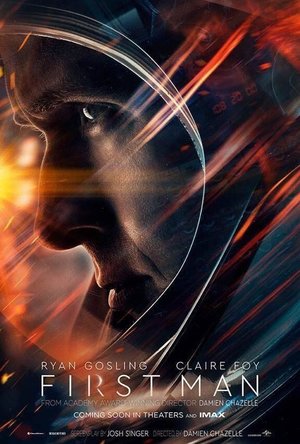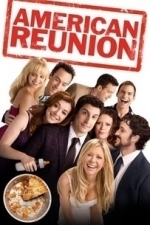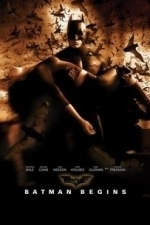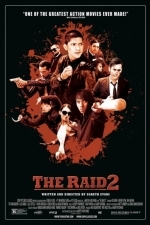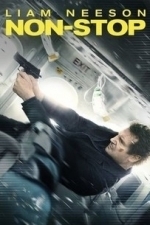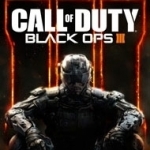Gareth von Kallenbach (980 KP) rated First Man (2018) in Movies
Jul 2, 2019
First Man by Universal Pictures and directed by Damien Chazelle (La La Land / Whiplash) takes us on the incredible journey of Neil Armstrong (Ryan Gosling) becoming the first man on the moon. The movie covers almost a decade of time, starting with the first scene of Neil Armstrong in a high-altitude test flight in his X-15 to of course the pivotal moment when he first steps foot on the moon. It’s a lot to pack into a film that only runs a bit over 2 hours (138 minutes to be precise) so even though it doesn’t go too deep into any particular event, it shows just enough of the journey to be very captivating.
The cinematography is both beautiful and a bit unsettling at the same time. It’s grainy and shaky, looking as though the film itself was shot in the same era that it portrays. There is a blend of new footage and actual footage that is practically impossible to distinguish from each other. There were many times throughout the film where I questioned whether the footage was actually pulled from original film, or simply filmed to appear that it was. Viewers who are sensitive to shaky camera sequences (where it looks like it is being filmed using an old 8mm handheld movie camera) or for those who prefer a crisper image of grainy footage might be slightly turned off, however I found the mix of both old and new incredibly interesting and it made all of the characters appear as if they were part of an archived documentary, instead of an entirely new film.
The video wasn’t the only mix that is present in the film as there is also a blend of old and new audio footage. They even used the original recording of the moon landing and seamlessly blended Ryan Gosling’s voice in where Neil Armstrong would have originally been heard. The mix of audio footage was done so flawlessly throughout the film that you may even start to believe that that Ryan Gosling and Neil Armstrong are one-in-the-same person.
Since the movie is based on Neil Armstrong himself and not directly on the space race, a lot of other critical events are simply introduced and then gone in a flash. The time jumps in the movie can be a bit confusing as well. For example, there are scenes where his wife Janet (Claire Foy) is pregnant one minute and the very next minute she has a young son running around. Years pass by in minutes in this film, even for crucial events. Another example is when we are introduced to the young astronauts training for the Gemini flights and then a short time later they are ready to complete their missions. Considering these astronauts were an important part of history, it would have been nice to see a little bit more of their development. The best way to describe these hasty time jumps is that they play out a lot like reading a Wikipedia article, the key points are shown and described in detail, but any of the character development (outside of Neil and his wife) is largely missing. That’s not to say that there aren’t other characters in the film that are important, they just aren’t the focus of the film.
If you are looking for a film that is action oriented like Apollo 13 or The Right Stuff, then you may be a bit disappointed in First Man as it is definitely more like a documentary than a Hollywood blockbuster. If you are however interested in the history of Neil Armstrong and his trials and tribulations on his way to the first moon landing, then you will be in for an incredible journey. Even though First Man seems more at home on the History Channel than Netflix, that’s what makes it such an interesting and enjoyable movie. I thoroughly enjoyed First Man and it’s excellent blend of history and personal storytelling makes it a great movie to see with the whole family.
Gareth von Kallenbach (980 KP) rated American Reunion (2012) in Movies
Aug 7, 2019
The new film reunites the entire cast from the original three films and centers around the gang’s 13 year high school reunion. Life has definitely taken them all in some unexpected directions. Jim (Jason Biggs) is married to Michelle (Alyson Hannigan), and are now parents to a little boy and enjoying a comfortable, if a tad uneventful, suburban lifestyle.
Oz (Chris Klein), is a successful Los Angeles sportscaster as well as a recent contestant on a popular national dance show. He spends his time mixing with celebrities and indulging a girlfriend who loves to party just a bit too much. Meanwhile, Kevin (Thomas Ian Nicholas), is happily married but needs an escape from a domestic routine that includes watching reality shows with his wife.
Finch (Eddie Kaye Thomas) fancies himself a nomadic spirit who wanders the globe from one esoteric adventure to another, still looking for his true love while Stiffler (Seann William Scott), works at a prestigious firm and remains the guy who never misses an opportunity to wisecrack or sexually harass any female who crosses his path.
As reunion-type movies go, there are the expected moments of awkwardness and hilarity. And of course, it wouldn’t be an American Pie movie without moments of ridiculously crude antics, mainly from Stifler. What separates the film from the bevy of raunchy comedies that flooded the market after the success of the initial film, is that there is some maturity amongst the mayhem.
In between the outrageous antics, the various characters are forced to take deep examinations of their lives since graduation and in some cases grow up for the first time in their lives. Oz must comes to grips with his feelings for his former girlfriend Heather (Mena Suvari), as does Kevin when his former flame Vicky (Tara Reid), returns to town for the reunion. Jim and Michelle have to find a way to bring some sexual spark back into their lives while Finch needs to accept the mundane reality of his. And Stifler. Well, let’s just say he needs to find his true calling.
What really sold the film for me was not just the great chemistry between the cast but the way the script deftly moved the raunchy comedy along while combining character development and depth that is not normally found in films of this type. As I watched, I found that I had really missed this crew of unlikely friends, and really enjoyed catching up with them even when they were not extricating themselves from one over-the-top situation after another.
While the film did drag a bit slightly there was always an outrageous moment right around the corner that had the theater errupting in laughter or shrieking in disbelief. This film is rated R for good reason. The cast worked really great together and it was especially nice to see Klein back in the mix, as he had been noticeably absent from the last film in no small part due to his offscreen issues.
Eugene Levy and Jennifer Coolidge (Stifler’s mom) have some absolutely hysterical moments in film especially when Mr. Levenstein, widowed now for three years, decides to cut loose at a party and we get to see has wild side. I would also encourage viewers to make sure to stay through the credits as there is more comedy from this pair that must not be missed.
The supporting characters from the previous films were all given their moments to shine even if it is just in a small cameo. Shannon Elizabeth, Natasha Lyonne, John Cho, and of course, the Sherminator were all given a chance to bring back some memories, making this film is welcome and enjoyably nostalgic trip. It proves that there’s still some life and good times left in the series, and if the creative talents can keep quality to this level I, for one, would certainly welcome another slice of pie in the future.
RəX Regent (349 KP) rated Batman Begins (2005) in Movies
Feb 19, 2019
Back in 2005, the hype for this film was building, with a new take on the old comic hero taking shape. Though I must admit that the design of the new Batmobile didn’t look cool to me, but I loved the concept of rooting him in a real world. The other questionable point was that lack of the big hitters in terms of the villains. The Joker, Penguin, Riddler and Catwomen were dumped in favour of The Scarecrow and Ra’s al Ghul, with only one that I, as the un-indoctrinated in comic book lore, that I had heard of being The Scarecrow.
But this was not to be a typical Batman film in any sense of the word. In June 2005, Batman was reborn and not only had the career of an independently styled filmmaker, Christopher Nolan blown into the big leagues but Blockbusters had just been redefined, an event not dis-similar in effect t those of Jaws and Star Wars in the 1970’s.
Batman, a Warner Bros. cash cow for decades, was about to cross all the main lines within the industry and a blockbuster with art house sensibilities and real intelligence was about to born. It’s not the first, but it opened the door for Nolan and his like to change the way we think about movies of this kind. It doesn’t seem to be that long ago that Marvel was dominating cinemas was some first-rate adaptations such as X-Men, Spider-man and the underrated Hulk, which in many ways may be classed as a prototype for this, with art house direction from Ang Lee.
The plot of Batman Begins isn’t really that important though that’s not to sell it short. It’s a highly developed and conceived story, packed from the opening frame to the 140th minute, but it’s simply the perfect blend of the evolution of Bruce Wayne into Batman, and the usual diabolical plans of the super-villain, only it doesn’t feel like that when you’re watching it. It feels like a well judged story about a traumatised young man, struggling to come terms with his parents murder, and his place in the world.
Luckily for him, his family are billionaires and his butler is Alfred, or more importantly, Michael Caine! There are of course a whole host of contrivances to explain how Batman’s image was forged, how the Batcave was created and where the Batmobile came from, but no-one’s suggesting that this a documentary. This is a more grounded and psychological approach to the story of a nutcase who dressed up like a bat and fights crime without a single superpower to his aid.
But it’s how Nolan brings all this together that works so well. He addresses things so subtly that you can end up missing them if you blink, or at least fail to see them coming. Wayne is turned into a flamboyant excentric to maintain a distance from his friends, if he even has any. The Batcave never ends up looking how we’d expect either, but it is full of bats if that helps and he does park his car there.
It is not until The Dark Knight that we see a Batcave of sorts and that isn’t even in the grounds of Wayne Manor. So, the direction, conception and writing are great, what about the casting? Christian Bale is Wayne/Batman for me, though the animatistic tone to his voice maybe a little overdone, but I do get it. Katie Holmes is the weakest link and am glad that she was recast for the sequel. The rest of the players are first-rate and this may well be on of the best casts ever assembled for a single film in my opinion.
Gary Oldman, so understated as Lt. Gordon, Caine as Alfred is perfect; Liam Neeson is on top form, which he isn’t always, let’s face it and Morgan Freeman, like Oldman and Caine can seemingly do no wrong. Then there’s Hans Zimmer‘s collaboration with James Newton Howard for the score which is one of Zimmer’s best. Howard is an able composer and he clearly provided many of the excellent emotional riffs, but it was Zimmer who brought this together with his dominant, strident style, colossal beats and pacing.
The look and sound of this film sets it apart from so many of its brethren. Batman Begins is a truly original, relentless and groundbreaking movie that is the best of the comic book movies by a mile, but not necessarily the best comic book adaptation. Spider-man or Watchmen for example, may qualify for the fact that they more literally reflect their respective sources but Nolan’s masterpiece is a blueprint as to how film should tackle such adaptations.
And yes, that’s right; Batman Begins is a masterpiece if ever there was one, though a slightly lesser one in comparison to its own sequel, The Dark Knight which may have completely rewritten the handbook.

Geofency Time Tracking
Utilities and Navigation
App
GEOFENCY enables full automatic location-based time tracking on iPhone, iPad & Apple Watch, where...

iTablaPro - Tabla Tanpura Player
Music and Lifestyle
App
Come sit down for a session with our Tabla Pro. Experience virtuoso, realistic tabla playing, and...
Gareth von Kallenbach (980 KP) rated The Raid 2 (2014) in Movies
Jun 19, 2019
Thanks in large part to DVD, the film gained a larger audience thanks to word-of-mouth and now the second in a planned trilogy has been released which ups the action to new levels of hyper connectivity and ultraviolent action.
The Raid 2: Berendal” takes place shortly after the events the first film where officer Rama (Iko Uwais), learns that his exploits in surviving the first film have only increased the danger facing him and his family as the corruption he exposed has made him a target with much more dangerous criminals higher up the food chain. Although he barely survived the events of the first film, Rama agrees to go undercover in a brutal prison in order to keep his family safe and get close to a key individual whose father is one of the biggest crime lords in the region.
His amazing combat skills are tested early and often in prison yet Rama is able to achieve this objective and becomes trusted associate in the crime syndicate following his release thanks to the contacts he made during his incarceration.
Unfortunately for Rama a power struggle is enfolding between son and father as the ambitious son is eager to take a larger slice of his father’s empire even if it means declaring war on the rival families. The film spends a good part of its first hour introducing the characters and setting the tables for the final hour as it intersperses a few fast and brutal fight sequences between.
The final 45 min. the film are essentially one extended fight scene after another that is utterly captivating to watch and despite it’s at times graphic brutality, impossible to look away from. Like the previous film, the speed, precision, originality, and choreography of the fight sequences are truly unique and have set new standards for martial arts films to follow.
While the film is presented in the native Indonesian language with English subtitles, it is very easy to get drawn into the dark and deadly world in which the characters find themselves. Uwais proves that he’s more than just a skilled screen fighter as he infuses Rama with the complexity of the man driven by duty yet utterly devoted to keeping his wife and newborn son safe even when the cost puts him in constant danger and forces him to be away from them for long periods of time.
Evans keeps the action flowing and time and time again aside from the clever way that he introduces what would only be disposal characters by giving them unique and at times charming quirks and characteristics, produces action sequences that leave you wondering how they were able to film them and what kind of person would think up such sequences. My wife commented to me that her blood pressure my surely have been rising from the relentless pacing and nonstop action and tension of the film and the constant barrage of action scenes that while brutal never become repetitive or gratuitous.
The film will not be for everyone as the action is quite brutal and times graphic however the free-form choreography that made the original so memorable has been taken to new levels in the sequel which keeps the action fresh as much as the story and characters keep you riveted during the non-action segments of the film .
All I could say the film is not one for the masses I can easily say this is one of the more enjoyable and better films of the year to date and is one that should not be missed especially if you’re a fan of police dramas or action films.
http://sknr.net/2014/04/11/the-raid-2-berendal/
Gareth von Kallenbach (980 KP) rated Non-Stop (2014) in Movies
Jun 19, 2019
In the new film Non-Stop, Bill is about to take a trans-Atlantic flight to London, and despite his dislike of flying and desire not to have a three day layover in London, reports for duty.
To say Bill is on edge would be an understatement as not only does he top off his coffee with a shot of spirits, he disables the airline smoke alarms so he can sneak a smoke to help calm himself and gather his thoughts.
Despite his issues, Bill is committed to his job and reports for duty and finds himself seated next to a charismatic lady named Jen (Julianne Moore), after she swaps seats with a passenger. Jen is a frequent traveler and noting that Bill seems on edge during takeoff, does her best to help calm him which Bill says will happen once they are airborne as he dislikes take offs.
True to his word, Bill is alert and ready to do his job once the plane is leveled off and en route to London. When a mysterious text arrives telling Bill that unless he deposits 150 million into an account, a passenger will be killed every twenty minutes, Bill swings into action and is determined to get to the bottom of the threat.
The flight crew is eager to put it off as a hoax as they state that a person cannot kill people on a crowded flight without being seen and it is likely just an elaborate hoax. Not convinced, Bill begins to investigate and asks for the passenger manifest to be rechecked and wants the account number he was given traced.
With the first deadline approaching Bill believes he has eliminated the threat when he uncovers a traitor in the midst in the guise of a fellow Air Marshall.
However text messages continue to arrive with instructions and Bill learns from his superiors that the account number given is in Bill’s name. Convinced that there is a viable threat Bill must fight to save the day when the crew, his bosses, and passengers believe he is deranged and actually hijacking the plane himself via an elaborate ruse.
While the film at times stretches credibility, it is for the most part a very tight and suspenseful and enjoyable film. My only issues were the final act at times seemed a bit to Hollywood and conventional for me but thanks to Neeson the film works.
The premise was engaging as was the cast and I was kept guessing as to the true nature of the threat as the film was good at casting suspicions then redirecting them throughout.
Like with the “Taken” films, Neeson is able to take a film that could be a mess in the hands of another actor but through his charisma and strong presence is able to give a character that although flawed is one that an audience can support.
French director Jaume Collet-Serra knows suspense from his part work with films such as “Orphan” and “Mindscape” and he wisely lets the film be a character driven story with action rather than an action film that happens to have characters.
As I said earlier, the final act was what kept the film from being a classic for me, but as it is, there is still plenty of good stuff to make this a film worth catching.
http://sknr.net/2014/02/28/non-stop/

Pocket Wiki for H1Z1 Lite
Reference and Utilities
App
Looking for help or the latest tips for the game H1Z1: King of the Kill or Just Survive? This...

Overcome Phobias by Glenn Harrold: Clinical Hypnotherapy for All Phobias
Health & Fitness
App
Glenn Harrold has drawn upon his 20-year experience as a clinical hypnotherapist to produce the two...
Gareth von Kallenbach (980 KP) rated the PlayStation 4 version of Call of Duty: Black Ops III in Video Games
Jun 19, 2019
Set in a future where combat technology is now imbedded into soldiers, allowing them to hack systems, control machines, and release all manner of electronic warfare, Black Ops 3 is a very ambitious entry into the series. The game also has a great feature that allows players to customize their appearance, weapons, and special features in the campaign instead of just relegating that feature to the multiplayer portion.
As if that was not enough, the game also allows up to four human players to play through the campaign as one unit, which is great for those with new players in the Call of Duty universe in tow.
The campaign is a mixed bag as at times the story is convoluted and the virtual reality based campaigns towards the end become frustrating as well as at times overly difficult.
Graphically the game shines and it is clear that the artists spent considerable love and effort on the game. Just walking around the ready room before missions alone lets one see the incredible level of detail in the game. The levels are pretty impressive as well from secret laboratories in Singapore to high rise locales in Egypt; the future is truly captivating and terrifying as envisioned by Treyarch.
The campaign despite the issues I had with it is not really the selling point of the series, as the multiplayer is where the game truly shines. With multiple formats of online play available as well as numerous maps and the ability to once again customize your weapon loadouts and killstreak rewards, comes a new class system. This allows players to play as a unique character with a special weapon or ability that becomes available to them after a certain amount of time.
While lots of fun, the old Call of Duty imbalances are there which become highly annoying. For instance, you unload a magazine into the chest of an oncoming enemy point blank. You hear the hits taking place, and while being hit, they can stop, draw a bow, and shoot you dead, all the while taking a barrage of machine gun fire. This sort of thing becomes highly frustrating as does the never ending barrage of hackers with their aim bots and other annoyances.
The Zombie mode of the game is a true classic With Jeff Goldblum and other Hollywood stars providing their voices and likenesses to a retro-locale where players can battle the undead.
In all, the game is a nice step forward as if the story of the campaign matched the customization it would really be something epic. But fans of the series know what to expect and Black Ops 3 gives them what they love about the series as well as some new features to push the series forward.
http://sknr.net/2015/11/21/call-of-duty-black-ops-3/
